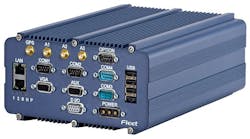Raytheon chooses Octagon Systems to supply FLEET rugged computers for LPD-17 shipboard electronics
WESTMINSTER, Colo., 10 Jan. 2013.Shipboard electronics integrators from the Raytheon Co. Integrated Defense Systems segment in Tewksbury, Mass., needed rugged computers for the U.S. Navy amphibious transport dock USS Somerset (LPD 25). They found their solution from Octagon Systems in Westminster, Colo.
Octagon officials announced this week they have received an additional delivery order from Raytheon to provide the Octagon rugged FLEET computers for the Somerset, as well as for several other of the Navy's San Antonio-class amphibious transport dock surface warships.
Related: NASA picks Octagon Systems for balloon computer
An amphibious transport dock, also called a landing platform/dock (LPD), is an amphibious warfare ship that embarks, transports, and lands U.S. Marine Corps expeditionary warfare landing forces.
The ships are designed to transport troops into a war zone by sea, primarily using landing craft, although they also can operate and transport helicopters. The San Antonio class is the Navy's newest ship of this type.
The Naval and Maritime Solutions segment of Raytheon Integrated Defense Systems is the ship electronics systems integrator for all San Antonio-class amphibious warfare ships and prime contractor for lifecycle engineering and support of Raytheon-designed and developed equipment.
Related: Rugged computers required
The Octagon open architecture FLEET line of rugged computers are based on the 1.6 GHz Intel Atom N270 microprocessor, and have the Octagon Hedgehog power supply for protection from the severe transients common in mobile power systems. The power system rejects load dumps, repeated transients, and over voltage. The high density extrusion becomes the heat sink for the CPU and other heat producing components.
Octagon designed the FLEET rugged computers for fanless operation over temperatures from -25 to 70 degrees Celsius. The computers accept Mini PCI, Mini PCI Express, and PC/104 Plus modules, as well as automotive hard drives or solid state disks.
Related: Rugged embedded computing at the crossroads
The FLEET computers meet MIL–STD 202G/214 for shock and vibration, run on an 8-to-36-volt power supply, and have three RS-232, one RS-232,422, or 485 COM ports. The computers also have four USB 2.0 ports, are compatible with Gigabit Ethernet, and support the Windows XPe or Linux operating systems.
For more information contact Octagon Systems online at www.octagonsystems.com, or Raytheon Integrated Defense Systems at www.raytheon.com.

